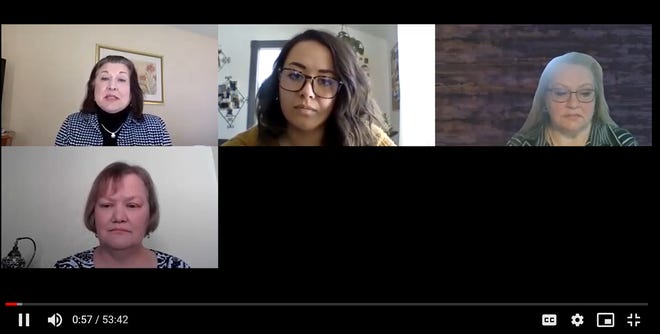Pueblo consultants talk about little one care and early studying, share sources
The future of Pueblo rests in the tiny but rapidly growing hands of its children.
And while the critical importance of quality childcare and early learning is well documented and widely accepted, many children – particularly in poor and middle-class families – still fall through the cracks.
To shed light on the importance of quality childcare and local efforts to create a safe and healthy environment for Pueblo children, the Pueblo Department of Public Health and Environment held a screening of the early care and educational documentation “No Small Matter” on Wednesday that followed a web-based panel discussion with local experts.
Leading the discussion were Angie Shehorn, Director of Children First at Pueblo Community College, Ida Rhodes, Interim Executive Director for Catholic Charities, Diocese of Pueblo, and Julie Zabolio, Infant and Young Child Mental Health Specialist at Health Solutions.
COVID-19: Coronavirus closes day care; Child carers fear they will never open again
Topics for discussion included the importance of children with emotionally well-regulated parents and caregivers as models of behavior, local resources for Pueblo families, and the significant challenges faced by early childhood education and childcare providers.
Rhodes opened the discussion by emphasizing that supporting Pueblo children means more than just supporting the children themselves.
“Parents, you are this child’s first and foremost teacher,” said Rhodes.
“They are the ones who are with the child from the start, before that child enters the classroom. Therefore parents must be supported in this role. “
Rhodes outlined some of the programs Catholic charities either run or work with local partners, such as home visit programs, parenting support programs, the parent-teacher education program, and the Pueblo Community Health Center’s partnership program for nurses and families, which is the first time Parents are guided from pregnancy to the second birthday of their baby.
“There has been a lot of work in Pueblo, but there is still much to be done and to grow,” said Rhodes.
“As a family resource center (Catholic charities) it has taken on more and more work to examine this in this two-generation lens – working with families on the development of the child, but then also with the adults, with the parents, on their own development . ”
According to Zabolio, Health Solutions’ early childhood team also offers various forms of support for parents, including traditional outpatient counseling from licensed doctors, adult psychological counseling services in the life of a child, a new program called Circle of Security that teaches parents to understand how important it is to create a secure bond in your relationship with your child and many others.
Shehorn mentioned that Children First at PCC, home of the Early Childhood Council – a network that works together and advocates for children and their families – has created a local childcare referral system that connects parents with full-time or part-time care providers as well as programs before and after school.
“Historically (childcare transfers) through the Colorado Shines Call Center in Denver,” Shehorn said.
“But we’ve mostly heard from parents and providers that this just doesn’t work for their local needs.”
The local remittance system can be accessed online at childrenfirstco.org.
In a question-and-answer section at the end of the panel, the experts were asked: “How can we better support the early education of children and families in our communities in Pueblo?”
Rhodes said people really need to pay attention to harnessing the brain research behind early childhood development and helping programming to build on what science says.
According to Rhodes, the economic component for disadvantaged families is a major barrier to high quality care.
“There’s so much we use that is just out of date,” Rhodes said.
“For example, we have public services that are determined by the federal poverty rate and that are simply no longer a reality, but no longer work for families.
“In 1996, a single parent with two children received US $ 570 for (temporary support for families in need). In 2018, the same family received $ 508 for TANF benefits. And even the determination of their qualifications for it is not based on reality. “
Education: The program seeks to expand to provide free distance learning assistance to key workers in Pueblo
She mentioned another standard called the Colorado Self Sufficiency Standard, which takes into account factors such as general household costs, housing costs, childcare and health care costs, and rates those factors on a county basis.
“If we could do more of this to figure out how we can help families, it would be a stronger mindset and a bigger difference when it comes to actually giving people some steps up the business ladder so they can get started, better support and be a healthier family, ”said Rhodes.
Another major threat to daycare centers and organizations that support children is a lack of funding, according to Zabolio.
“We don’t expect elementary schools to raise their own funds to run their programs, but early childhood learning and learning programs need their own budget and funding sources,” said Zabolio.
“From a political point of view, money is always a helpful thing. And for a normal person in the community there are ways in which you can support our local centers. If they have a fundraiser, support their fundraiser. You might call a director of the (childcare organization) and say, “What’s on your wish list? What do you need?’ And then through volunteering … just being that relational support person. There are ways you can help at this level as well. “
Chief reporter Zach Hillstrom can be reached at [email protected] or twitter.com/ZachHillstrom


Comments are closed.